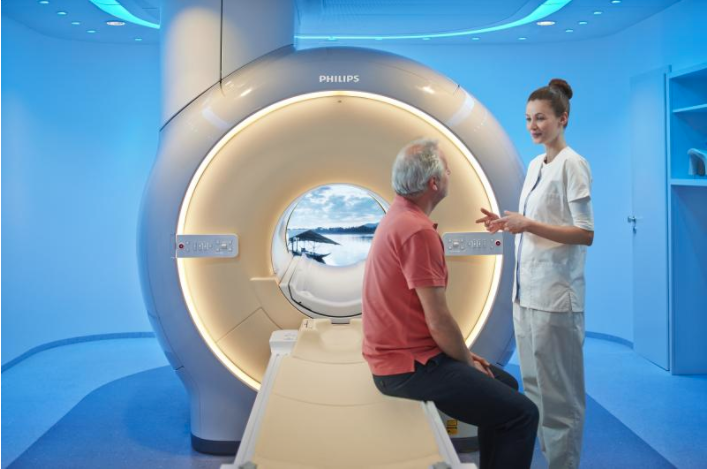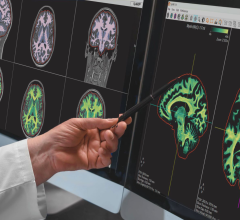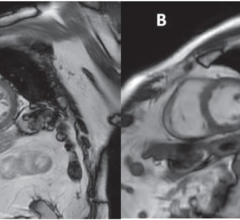
The U.S. Food and Drug Administration (FDA) announced in a new drug safety communication is this week that it is requiring a new class warning and other safety measures for all gadolinium-based contrast agents (GBCAs) used for magnetic resonance imaging (MRI). This includes increased patient education and requiring gadolinium contrast vendors to conduct additional animal and clinical studies to assess the safety of these agents.
The FDA said it is known that gadolinium remains in patients’ bodies, including the brain, for months to years after receiving these drugs. The FDA said there is no clinical evidence that directly links gadolinium retention to adverse health effects in patients with normal kidney function, and the FDA has concluded that the benefit of all approved GBCAs continues to outweigh any potential risks.
However, after additional review and consultation with the Medical Imaging Drugs Advisory Committee, the FDA is now requiring several actions to alert health are professionals and patients about gadolinium retention after an MRI using a GBCA, and actions that can help minimize problems. These include requiring a new patient medication guide, providing educational information that every patient will be asked to read before receiving a GBCA. The FDA is also requiring manufacturers of GBCAs to conduct human and animal studies to further assess the safety of these contrast agents.
To date, the only known adverse health effect related to gadolinium retention is a rare condition called nephrogenic systemic fibrosis (NSF) that occurs in a small subgroup of patients with pre-existing kidney failure, the FDA said. The agency has received reports of adverse events involving multiple organ systems in patients with normal kidney function. However, a causal association between these adverse events and gadolinium retention could not be established.
This is an update to the FDA's May 22, 2017, MedWatch safety alert "Gadolinium-based Contrast Agents for Magnetic Resonance Imaging (MRI): Drug Safety Communication - No Harmful Effects Identified With Brain Retention".
GBCAs are used with medical imaging devices called MRI scanners to examine the body for problems such as cancer, infections, or bleeding. GBCAs contain gadolinium, a heavy metal. These contrast agents are injected into a vein to improve visualization of internal organs, blood vessels and tissues during an MRI, which helps healthcare professionals diagnose medical conditions. After being administered, GBCAs are mostly eliminated from the body through the kidneys. However, trace amounts of gadolinium may stay in the body long-term. Many GBCAs have been on the market for more than a decade.
Linear vs. Macrocyclic Gadolinium Agents
There are two types of GBCAs based on their chemical structures —linear and macrocyclic. The FDA said research shows linear GBCAs result in more retention and retention for a longer time than macrocyclic GBCAs. Gadolinium levels remaining in the body are higher after administration of Omniscan (gadodiamide) or OptiMark (gadoversetamide) than after Eovist (gadoxetate disodium), Magnevist (gadopentetate dimeglumine), or MultiHance (gadobenate dimeglumine). Gadolinium levels in the body are lowest after administration of Dotarem (gadoterate meglumine), Gadavist (gadobutrol) and ProHance (gadoteridol).The gadolinium levels are also similar across these agents.
The agents cleared for use in the United States that are included in this safety communication include:
Including:
• Ablavar (gadofosveset trisodium)
• Dotarem (gadoterate meglumine)
• Eovist (gadoxetate disodium)
• Gadavist (gadobutrol)
• Magnevist (gadopentetate dimeglumine)
• MultiHance (gadobenate dimeglumine)
• Omniscan (gadodiamide)
• OptiMARK (gadoversetamide)
• ProHance (gadoteridol)
FDA Recommendations for Patients and Clinicians Regarding Gadolinium Agents
The FDA is recommending healthcare professionals should consider the retention characteristics of each agent when choosing a GBCA for patients who may be at higher risk for gadolinium retention (see Table 1 listing GBCAs). These patients include those requiring multiple lifetime doses, pregnant women, children, and patients with inflammatory conditions. Minimize repeated GBCA imaging studies when possible, particularly closely spaced MRI studies. However, do not avoid or defer necessary GBCA MRI scans.
Patients, parents, and caregivers should carefully read the new patient Medication Guide that will be given to you before receiving a GBCA. The Medication Guide explains the risks associated with GBCAs. Also tell your health care professional about all your medical conditions, including:
• If you are pregnant or think you might be pregnant
• The date of your last MRI with gadolinium and if you have had repeat scans with gadolinium
• If you have kidney problems
• Healthcare professionals and patients are encouraged to report adverse events or side effects related to the use of these products to the FDA's MedWatch Safety Information and Adverse Event Reporting Program:
Complete and submit the report Online: www.fda.gov/MedWatch/report. Download form or call 1-800-332-1088 to request a reporting form, then complete and return to the address on the pre-addressed form, or submit by fax to 1-800-FDA-0178
Read the MedWatch Safety Alert, including a link to the FDA Drug Safety Communication, at: www.fda.gov/Safety/MedWatch/SafetyInformation/SafetyAlertsforHumanMedicalProducts/ucm589580.htm
Related Content on Gadolinium Toxcity
Radiology Has Failed to Properly Assess or Track MRI Gadolinium Contrast Safety
VIDEO: How Serious is MRI Gadolinium Retention in the Brain and Body?
Recent Developments in Contrast Media
FDA Committee Votes to Expand Warning Labels on Gadolinium-Based Contrast Agents
European Medicines Agency Issues Update on Gadolinium Contrast Agents
ISMRM Issues Guidelines for MRI Gadolinium Contrast Agents
FDA: No Harm in MRI Gadolinium Retention in the Brain
VIDEO: MRI Gadolinium Contrast Retention in the Brain
MRIs During Pregnancy Are Safe, But Gadolinium Scans May Increase Risk to Fetus
Study Finds No Association Between Gadolinium Contrast and Nervous System Disorder
Study Highlights Important Safety Issue with Widely Used MRI Contrast Agents
Gadolinium May Remain in Brain After Contrast MRI
Contrast Agent Linked With Brain Abnormalities on MRI
FDA Approves First Macrocyclic and Ionic Gadolinium-Contrast Agent for MRI


 April 17, 2024
April 17, 2024 








